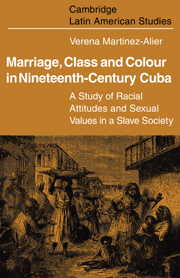 Marriage, Class and Colour in Nineteenth Century Cuba
Marriage, Class and Colour in Nineteenth Century Cuba Published online by Cambridge University Press: 09 October 2009
marriage between whites
The issue of slavery deeply divided opinion within the white community. For political and economic reasons some sectors favoured interracial marriage, but many abolitionists would probably have thought twice about marrying their daughters to a coloured person. Even the common man prided himself on his purity of blood, his sole mark of distinction. One should not think, however, that race obliterated any other criteria of status definition among whites themselves. Differential socio-economic status within their own ranks played a role with regard to marriage, and gave grounds for parental opposition. Opposition to marriage among whites was often motivated by such criteria as birth, wealth, occupation and religion. There was clearly nothing very specific to Cuba in all this as compared, for instance, with Spain and other European countries at the time, where possibly the opportunities for individual advancement were more limited than in Cuba. More characteristic of Cuba, however, was the preoccupation over race which reinforced the concern over ascription.
The stated aim of the 1776 Royal Pragmatic on marriage was to prevent any marriages that gravely offended the family's honour and threatened the State. No instructions were issued, however, neither with the Pragmatic nor in later legislation, on the terms on which an intraracial marriage could be deemed unequal and therefore objectionable. Canon law established a number of specific impediments to marriage such as consanguineous, affinal and ritual kinship. Social impediments were left to custom, and became explicit only when parents, making use of their legal rights, opposed a marriage by their minor children before the civil authorities.
To save this book to your Kindle, first ensure no-reply@cambridge.org is added to your Approved Personal Document E-mail List under your Personal Document Settings on the Manage Your Content and Devices page of your Amazon account. Then enter the ‘name’ part of your Kindle email address below. Find out more about saving to your Kindle.
Note you can select to save to either the @free.kindle.com or @kindle.com variations. ‘@free.kindle.com’ emails are free but can only be saved to your device when it is connected to wi-fi. ‘@kindle.com’ emails can be delivered even when you are not connected to wi-fi, but note that service fees apply.
Find out more about the Kindle Personal Document Service.
To save content items to your account, please confirm that you agree to abide by our usage policies. If this is the first time you use this feature, you will be asked to authorise Cambridge Core to connect with your account. Find out more about saving content to Dropbox.
To save content items to your account, please confirm that you agree to abide by our usage policies. If this is the first time you use this feature, you will be asked to authorise Cambridge Core to connect with your account. Find out more about saving content to Google Drive.